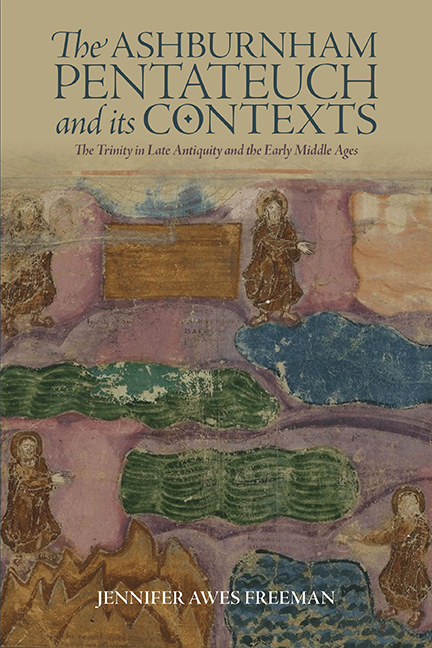Book contents
- Frontmatter
- Dedication
- Contents
- List of Illustrations
- List of Abbreviations
- Introduction: Losing and Finding the Ashburnham Pentateuch
- 1 Early Trinitarian Texts and Debates
- 2 The Trinity in Early Christian Images
- 3 Carolingian Conceptions of the Trinity
- 4 Carolingian Image Theory
- 5 The Carolingian Reception of the Ashburnham Pentateuch
- Conclusion: Possible Motivations for the Ashburnham Pentateuch Erasures
- Coda: The Afterlives of the Ashburnham Pentateuch
- Acknowledgments
- Bibliography
- Index
- ALREADY PUBLISHED
Introduction: Losing and Finding the Ashburnham Pentateuch
Published online by Cambridge University Press: 26 May 2022
- Frontmatter
- Dedication
- Contents
- List of Illustrations
- List of Abbreviations
- Introduction: Losing and Finding the Ashburnham Pentateuch
- 1 Early Trinitarian Texts and Debates
- 2 The Trinity in Early Christian Images
- 3 Carolingian Conceptions of the Trinity
- 4 Carolingian Image Theory
- 5 The Carolingian Reception of the Ashburnham Pentateuch
- Conclusion: Possible Motivations for the Ashburnham Pentateuch Erasures
- Coda: The Afterlives of the Ashburnham Pentateuch
- Acknowledgments
- Bibliography
- Index
- ALREADY PUBLISHED
Summary
In 1883, Frank Leslie's Sunday Magazine published its fourteenth issue, its publishing house about a ten-minute walk from the recently opened Brooklyn Bridge. The English-born Frank Leslie had published numerous iterations of weekly periodicals in the United States over the span of about three decades, all richly illustrated, as he was an established engraver. After his death in 1880, Leslie's second wife, who went so far as to legally change her name to “Frank Leslie” in 1881, took over the management of his affairs. Frank Leslie's Sunday Magazine compiles articles on the topic of religion. However, its scope is much broader than one might expect for its nondenominational Protestant approach – including Christian, Muslim, and Jewish theology, practices, and material culture in South and North America, Africa, and Asia.
In this particular volume, nestled between articles on “Rome as Paul Saw It” and “Sacred Books of Different Religions,” two folios of a late antique Pentateuch were reproduced (figs. 1 and 2). At the time, the Ashburnham Pentateuch (Paris, Bibliothèque nationale de France, NAL 2334) had only just found a home at the British Museum, thanks to a gift by the earl of Ashburnham, its most recent namesake. The article in Frank Leslie's Sunday Magazine described the Pentateuch as “one of the most ancient, and at the same time most curious” of the Ashburnham manuscript collection, identifying its origins as seventh-century Italy. The anonymous author of this spot seems to have been most interested in the costumes and architecture as historical evidence of the period, but also took the effort of translating every Latin inscription of the two folios (fols. 56r and 58r) that narrate the illustrated Exodus scenes.
This article appeared on the occasion of the 1883 publication of The Miniatures of the Ashburnham Pentateuch. Written by Oscar von Gebhardt at the request of the earl of Ashburnham, this facsimile’s introduction went to some lengths to explain (read: justify) how the manuscript made its way from Tours to London in 1847. In his analysis, von Gebhardt described the first extant miniature of the manuscript (fol. 1v, Plate I), which depicts the first few days of Creation.
- Type
- Chapter
- Information
- The Ashburnham Pentateuch and its ContextsThe Trinity in Late Antiquity and the Early Middle Ages, pp. 1 - 19Publisher: Boydell & BrewerPrint publication year: 2022

